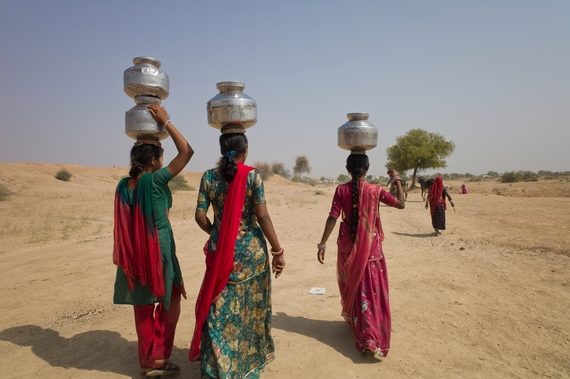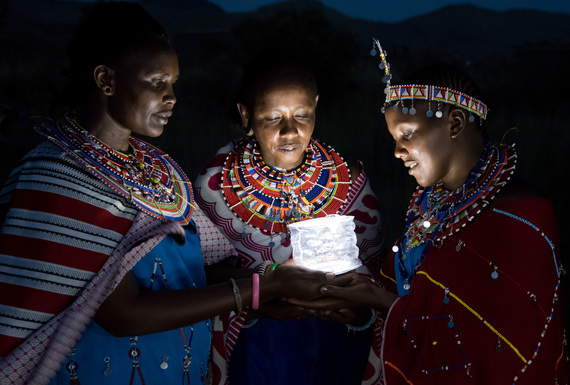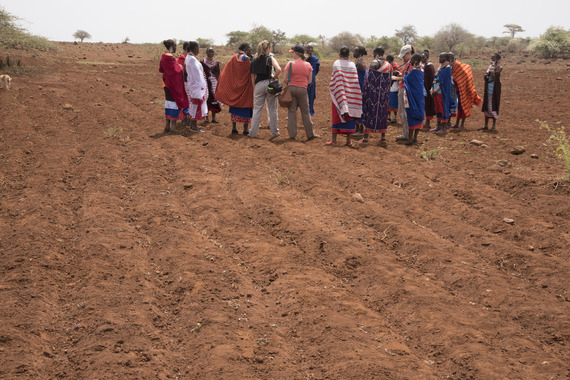Time is a finite, non-renewable resource. There are twenty-four hours in the day. Each and every day we have to accomplish certain things in order to survive and to ensure that our children are able to grow and, hopefully, thrive. We have to find food and water. We need to ensure that we have energy in order to cook, clean and stay warm. We need access to medicine when we are sick. In development lingo we call the ability to consistently access and benefit from these resources 'security', i.e. food security, water security, energy security, and health security.
While the need to obtain food, water, energy and medicine is shared by the more than 7 billion of us alive today, the amount of time it takes for each of us to achieve these tasks varies considerably. For example, poor rural women in developing countries are most frequently charged with water security and must walk for hours to obtain water. Comparatively, those of us in developed regions walk to a sink, a water cooler, or a refrigerator for a drink of water. We then take the balance of the time saved and hit the gym, cook a nutritious meal for our family, study, or prepare for a meeting. Maybe we just relax for a few minutes which translates into improved health security. If you are reading this, you are time secure and operate at a time surplus. But billions of people around the world are time insecure. There are simply not enough hours in the day to gather all of the resources needed for survival. These families operate at a time deficit. Importantly, the majority of time-insecure people are women.
 Women from developing nations often walk hours to secure water.
Women from developing nations often walk hours to secure water.
Photo © Lynn Johnson/Ripple Effect Images
Environmental organizations have begun to address the links between access to food, water, energy and medicine with natural resources as a justification for investing in landscapes, seascapes and biodiversity conservation in general. This is an important strategic advancement for the environmental movement for two important reasons. 1. the majority of the world's poor live in rural communities and rely directly on natural resources for survival. Most of these people are women and children. 2. When people rely on natural resources for survival, they will break established rules such as 'do not use this area to collect firewood" or "do not hunt this species" because not accessing those resources often means life or death for themselves or their families. Simply put, laws that prohibit moms and dads from accessing the resources they need to keep their children alive may work in the short term but in the long term, survival trumps compliance.
Despite this change in the environmental perspective, a lot of conservation solutions are being developed and deployed that fail to account for time security. These solutions are of particular concern in the face of climate change because climate change further jeopardizes time security as it takes much longer to recover from droughts, floods and other natural disasters, and it takes more time to plow degraded land, access water sources that are increasingly remote and contaminated, or find firewood that is increasingly scarce. When these already time insecure families are asked to do things like practice sustainable farming, plant trees, or avoid gathering resources in protected areas, their time budget simply does not allow it, even though over the long term these efforts are likely to generate a time surplus. "Tomorrow" is real, "next week" is a theory for billions of people around the world.
Many conservation groups have attempted to counter additional burdens imposed by sustainable practices and conservation measures with financing mechanisms. These mechanisms are diverse and include things like payment for ecosystem services, forest certification schemes, and alternative income opportunities among others. Unfortunately, these payment tools only work if the financial benefit is received by those incurring the additional time burden. In many cases, conservation organizations focus on the community or the household level. However, in most families, the workload is divided and the women oversee food, water, energy and medicine but the men are the beneficiaries of conservation payment programs.
If conservation organizations were to include time security in their analysis, specifically, who spends time doing what at the household level, an array of exciting conservation solutions emerge. The Maasai Wilderness Conservation Trust (MWCT) is doing just that. MWCT used solar lanterns to provide clean, green energy for women in Southern Kenya. These lights not only illuminate homes but provide improved health by eliminate toxic kerosene fumes. The women no longer have to spend time chopping down trees and gathering firewood to sell so that they can buy the kerosene. The newly available time and money is being used to start small businesses such as bee keeping, bead making and other innovative ventures. With the income savings women are able to send kids to school and build houses. The time savings is also passed onto children who are able to study rather than do household chores. Women are adjusting their daily activities to include more time intensive activities like planting grass-seed banks to reseed rangelands.
Benjamin Franklin's well-worn adage 'Time is money' applies to the uber-wealthy and the ultra-poor alike. However, most of the ultra-poor live in rural communities and rely on natural resources for survival. Understanding nuances of decision making at the household level, specifically regarding who needs more money and who needs more time, will help environmentalists shape much more effective strategies.
 Maasai women save time and money with solar lanterns.
Maasai women save time and money with solar lanterns.
Photo © New Course
 Maasai women meet with program officers from MWCT to inspect a new grass seed bank. Grass seeds will be harvested and sold to reestablish degraded habitat in the rangelands. Photo © New Course
Maasai women meet with program officers from MWCT to inspect a new grass seed bank. Grass seeds will be harvested and sold to reestablish degraded habitat in the rangelands. Photo © New Course